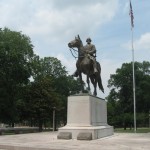While many individuals are rightfully placing primacy on how American political discourse still obscures the experiences and epistemological framework of black women such as First Lady Michelle Obama, others wish to centralize the role that religious discourse about the President plays in advancing racist rhetoric. Although such individuals are astute and perhaps accurate in observing that accusing Obama of being Muslim constitutes the sort of Islamophobia that is rife with both racism and an aversion to religious plurality, the aforementioned accusations and rebuttals from those interested in implementing more multicultural rhetoric and realities may help put these ideals in perpetuity by critically questioning whether Obama’s policies are informed by the sort of spiritual thought that recognizes the full humanity of all people.
Although some might question whether interpreting Obama’s political decisions in light of his spiritual beliefs is appropriate or relevant, the role that religious beliefs play in determining one’s ideology and praxis seems inalienable. According to the Washington Post, Obama stated that Christian beliefs guide his decision-making policies with respect to the government during a National Prayer Breakfast. In delineating what these beliefs entailed, the Post stated that Obama used biblical scriptures to push for a more equitable economy. Additionally, he argued that his proposal to raise taxes on wealthy Americans paralleled the teachings of Jesus. Yet if Obama’s interpretation of bible passages and the life of Christ engender his belief in creating economic parity, what does the fact that the President has yet to keep his pledge to raise the minimum wage say about his commitment to creating systems designed to ensure upward mobility for the poor?
Read the rest here
















